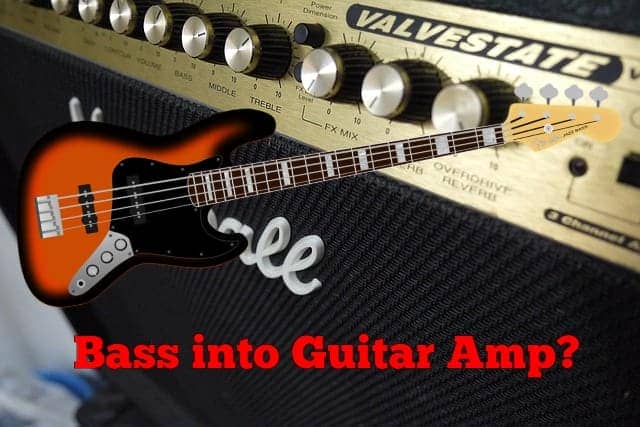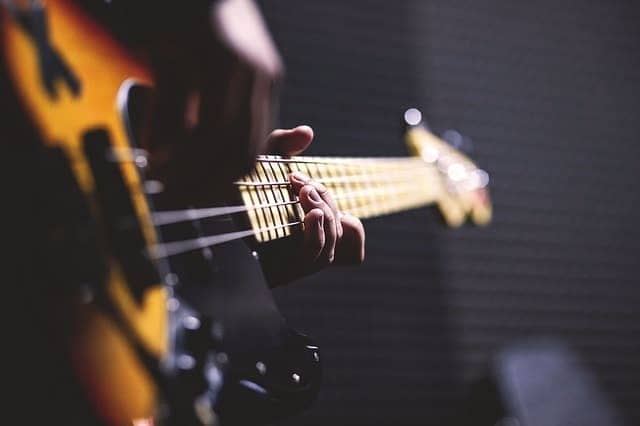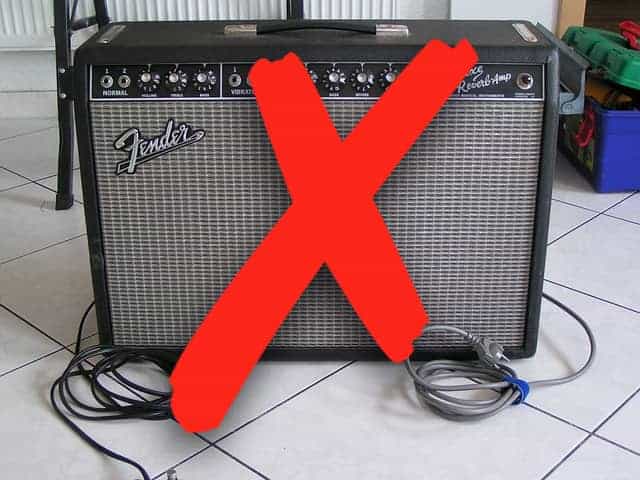
The general internet advice for plugging a bass into a guitar amp is somewhat divided. One camp says it is perfectly fine and causes no harm, whereas the other camp calls it sacrilege and can damage your precious amp’s speakers.
So who is right and ultimately can it be done?
This post is your quick guide to everything using a bass through a guitar amp discussing: tone, function, amp safety, and the situations it’s ok and not ok.
The Short Answer…
A bass guitar can be amplified through a regular guitar amp which can function as a low-cost practice amp. However, regular guitar amps are not designed to handle the ‘low frequencies of a bass compromising the tone and potentially damage the speaker if the volume and low-end vibrations are extensive enough.
Connecting Bass and a Guitar Amp
The truth is you can connect a bass into any guitar amp and it will function perfectly fine at low volumes.
Granted it will not give you the desired smooth and low-end sound of a bass which is obvious as you cannot expect a good sound from an amp matched with an instrument it was not designed for.
However, for general practice and noodling in the bedroom, a guitar amp can serve as a good stand-in bedroom practice amp when you keep the signal clean and the volume low. Some reasons why you would use your bass with a guitar amp maybe…
- Guitarist wanting to learn bass on the side
- Cannot afford a bass amplifier
- Do not own a spare bass amplifier
- Want to record bass for a band recording
- Experimenting
Keep in mind, there are situations where you should avoid using a
How Does the Tone Sound?

The general tone when using a bass with a guitar amp will sound noticeably mid-focused and colored instead of ‘smooth’, ‘clean’, and ‘thick’ similar to a regular bass tone.
This is to be expected as a regular guitar amp is designed to emphasize the voiced mid-range frequencies of a guitar and not the low-end frequencies of a bass.
Although I cannot speak for all guitar amps but in my experience, you can get a workable bass tone from most guitar amps which are fine for just general bedroom practice.
Keep in mind, I do not recommend using a tube/valve amp for reasons I will explain later (just don’t do it.)
Connecting a bass into a guitar amp serves a good purpose and can produce a useable sound when played at low bedroom volumes.
Play around with your bass tone control and your amps EQ depending on your amp and you could actually get a decent and workable bass tone for bedroom volumes.
Video Demonstration (Watch)
Avoid Rattling and Distortion
The main characteristic which is true of all guitar amps when connected to a bass guitar is when the master volume is increased past a certain threshold (depending on the amp.)
The amp’s speaker will begin to rattle and distort when playing, producing an aggressive and unpleasant sound not ideal for practicing.
The speaker rattles and distorts when playing notes past a certain amount because the speaker can no longer handle the low vibrations of the bass, especially at higher volumes. The tone will also sound ‘brittle’ and ‘harsh’ which is not good listening.
This is to be expected because regular electric guitar amps are designed for the usual mid-range frequencies of an electric guitar and not the thumpy low-end frequencies of a bass.
For playing at low volumes It is certainly fine for getting a workable bass tone for general practice depending on your amp. Just remember to keep the master volume to a minimum.
Keep the Volume Low
- Go easy on the volume (start it low and gradually increase)
- Do not add external distortion
- Increase the amps bass EQ
- Lower the amps treble EQ
- Play with the bass tone controls for a better tone
I would keep the signal dry and not add any boosters, overdrives, or distortion to the signal to keep the tone as smooth as possible unless you want to experiment with sounds.
Unless you want a distorted tone for metal I would use a distortion pedal to color the tone and not the rattling and distortion from the speaker due to the speaker being unable to handle vibrations and volume. This brings me to my next point…
Bass + Guitar Amp = Metal Tone
(Side note) some bass players in the metal genre have been known to record bass using a regular guitar tube amp. The simple reason why is because they like the aggressive, harsh, and ballsy sound it can produce more than a regular bass amp.
Step forward Lemmy Kilmister (RIP) of the legendary band ‘Motorhead’ just think of the opening iconic bass line to the song “Ace of Spades” to get my point.
Lemmy was known to use Marshall 100 watt tube amp stacks in combination with his Rickenbacker bass to create that massive and thunderous bass tone. (Who needs a bass amp after all!)
Lemmy’s Crazy Bass Tone
Recommended Guitar Amps for Bass
There’s no exact science to this answer common sense will be your best guider. In theory, you can use any guitar amp with a bass guitar.
However, I would not recommend giving you the green light plugging your bass into anything, I do not want to be the person that recommended connecting your bass into your brand new Mesa Boogie Rectifier.
Go Ahead!
- Starter kit practice amps
- Low watt solid state combos
- Small speaker combos
- Back up amps (solid state)
- Amps that are lower than $300 in value
- Amps that have fallen out of favor
Not Ok!
- Tube/valve amps
- Any amp worth more than $400
- Any amp with a standby switch
- Anything 30 watts or more (solid state or tube)
- Hybrid amps
- Your main gigging amp
- Anything combined with a 4×12
Speaking of which, my related post is all about whether you can connect a bass to regular guitar pedals. Learn the differences between both types of pedals.
Do Not Connect a Tube Amp

As we all know, tube amps are the most fragile of all the amplifiers out there and expensive. There’s something about tube amps that we need to be more delicate with as all gigging guitar players know when transferring them to gigs and cranking them when playing live.
Unlike solid-state, valve amps adopt power tubes to power and amplify the signal, as good as they sound when pushed, power tubes are comprised of delicate components which are housed in fragile glass containers that will not take much to break especially after hours or even years of heavy use.
Tubes Amps are Fragile
Plugging a bass into a regular guitar tube amp, therefore, is not a good idea for the first reason that tube amps are designed to be played loud and as we have already discussed playing bass through a regular guitar amp will not deliver the best tonal results which should be avoided.
Secondly, the rattling speaker that comes with playing a bass high volume through a guitar amp could be so severe you could risk damaging or breaking one of the power tubes (which are remember made from fragile glass) due to the harsh low frequencies of the rattling.
A delicate tube amp was not designed for the thudding of a bass hence why I recommend using a more sturdy and reliable solid-state amp.
I also have other concerns about the mismatched impedance that the bass could bring to the fragile circuitry, electronics and components. I do not have a concrete answer for these concerns but I would suggest using common sense and logic for using a tube amp with the wrong instrument being more fragile in nature.
Tube Amps are Expensive to Repair
Although some people will say it’s fine and have done in the past but for me personally I believe we all work hard for our items and pleasures in life, therefore it’s not cool to play Russian roulette with your $500+ amp and speaker you worked hard to earn, it’s not worth risking.
Hence why most bass guitars sound so distorted even on a clean channel with no gain. The poor speaker is over vibrating trying to handle the aggressive and pronounced lows from the bass which it was never designed to do. Using a more robust solid-state amp on a clean channel would be the best option.
As a side note, I have a post explaining the main reasons why tube amps are so expensive
It’s Not a Gigging Amp!
The only circumstances you can play a bass through a guitar amp (in my opinion) is at ‘low volume’ for ‘bedroom practice’ and certainly not for reaching volumes for a full band rehearsal and definitely not playing a live gig (if it has enough wattage.)
The main concern the speaker reason is that they were never designed to be played at gigging volumes for that purpose hence why you risk damaging the amp and the speaker when reaching extreme volumes combined with a bass guitar.
Bass Amp and Guitar Amp Differences?
The main difference that sets bass amps and regular amps apart
A guitar amp is designed to take a clean signal from the guitar’s pickup, color it, amplify it and add distortion in the form of gain if you wish. The bass amp is also designed to pick up a wider range of frequencies than a regular guitar amp.
Speaker Size
Speaker size is another feature that sets bass amps and regular guitar amps apart. The reason is obvious, a larger speaker will assist the amp with a thicker and more low-end sound compared to a smaller speaker.
A larger speaker is always present on bass amps as they will be moving more air to handle and accurately represent the sound of the bass frequencies.
This movement will demand more space within the cabinet, to get the best bass response and sound, the cabinet will be a ‘closed back’ design. These are the reasons why bass amps can handle and provide a smooth bass tone.
Wattage
When it comes to wattage or power output. Bass amps are typically higher wattage than guitar amps. Solid-state guitar amps go from 50 – 150 watts, whereas bass amps start from 200 watts all the way to 1200.
The reason is that bass amps require more headroom for reproducing a ‘clear’ and ‘defined’ low-end signal and moving larger speakers for projecting a low-end bass tone.
Another important feature that is true of bass amps is the typical ‘pad’ button. This is a useful feature when it comes to tone. It essentially ‘deadens’ the input signal from the guitar.
Why is this useful? If the bass you are rocking includes a pair of ‘active pickups.’ The input signal from the guitar can be too hot for a clean tone or recording.
Related Questions
What is the typical price range for practice bass amps?
A solid-state bass amp combo for home practice can start as low as $40 to $200 depending on wattage power and features. Amps above $200 are aimed towards gigging and will include a higher wattage for playing live.
Ideal wattage for a home practice bass amp?
For a solid-state practice amp, 100 watts would be a suitable amount of power for playing volumes ideal for home use. A Solid-state combo amp would be the best option as it will include more features and be less expensive than a tube amp.
Related post…
Moving onto bass amps, Want to learn the difference between solid-state and tube for bass amps? Read my post to find out!
